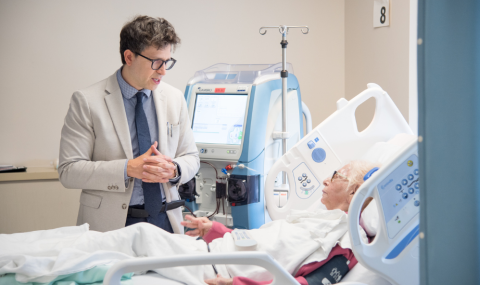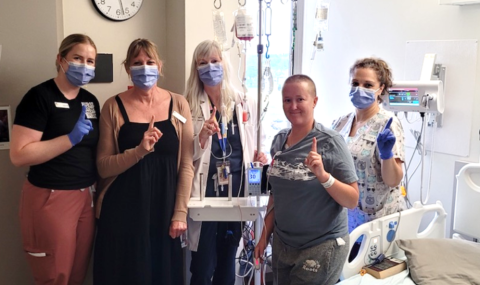Understanding our impacts and creating positive change
London Health Sciences Centre’s (LHSC) Ecological Stewardship Program originates in the hospital’s energy conservation initiatives, which ramped up in 2000 with the development of an award-winning energy awareness program. Today, the Ecological Stewardship Program uses a holistic approach to understanding and reducing the hospital’s environmental impact.
We monitor energy use, waste and recycling generation, water consumption, and impacts on the local environment. Armed with this data, we use innovation, vendor partnerships, education and awareness initiatives, staff involvement, holistic approaches, and new technologies to reduce our environmental impact. Read more below:
Energy Stewardship
Goal
Minimize the economic impact of energy consumption on the hospital while addressing climate change and air quality issues.
Accomplishments
- Retrofitted over 32,000 T8 fluorescent tube lights at Victoria Hospital and University Hospital in 2022 with LED equivalents. This saves us around $350,000 per year in electricity costs and reduce our greenhouse gas emissions by nearly 1,200 tonnesCO2e, equivalent to removing 260 gasoline-powered cars off the road.
- Replaced all the old windows and doors at University Hospital with new energy efficient ones from 2017-2021.
- Developed a greenhouse gas reduction action plan that outlines various paths to meet the greenhouse gas reduction targets in the Paris Agreement.
- Have embedded LHSC Energy Management Specialists in every Facilities capital project to ensure sustainability options are considered at every project’s start.
- Through energy performance contracts, we have implemented a broad range of energy conservation measures since 2005. Under this approach, an external energy services company completes an energy audit of the hospital’s buildings. A project is then designed to reduce energy consumption using a variety of measures, including heat recovery systems, lighting upgrades, and the replacement of boilers and chillers with newer, more efficient models. These improvements are funded by the guaranteed annual savings that they generate. Once the costs of the improvements are recovered by the contractor, the savings accrue to the hospital.
Waste Reduction
Goal
LHSC has a goal to use the 3Rs — reduce, reuse, and recycle, and to decrease the annual volume of waste generated at LHSC.
Accomplishments
- We practice single-stream recycling; all recyclable products go into the same blue bin. This includes plastics #1 to #7, fine paper, tin, aluminum, steel, cardboard, boxboard, newspaper, coffee cups, and glass.
- We’ve adopted an electronic medical imaging system, thereby eliminating the paper, chemical, water and plastic waste that was generated during the production of three million hard copy films annually.
- We’ve worked with an external company to recycle fluorescent lamps, diverting phosphor powder, aluminum and mercury from landfill.
- We’ve implemented the re-usable Sharpsmart container system for the disposal of our biological hazardous waste, thereby preventing the disposal and incineration of several tonnes of single use plastic.
- We recycle all of our electronic waste and batteries through an external vendor.
- We’ve eliminated mercury thermometers and 99% of mercury-containing blood pressure manometers.
- We recycle all our scrap metal through an external vendor.
- We have an external vendor collect our wooden pallet boards at both Victoria and University Hospitals, where they can be repurposed by other companies.
- We’ve implemented a furniture re-use program through an external vendor that re-purposes furniture, diverting re-usable furniture from landfill.
- We’ve added statements regarding excess packaging to our requests for proposal for the supply of goods and services.
- We’ve implemented a clear blue bag policy so that recycling materials are more visible for staff who are sorting our waste.
- We’ve introduced organics recycling in the back areas of our cafeteria and retail locations. We have also introduced a De-Pack program in our Patient Food Services, accounting for all unopened, packaged foods.
Green Procurement
Goal
Developed a strategy to foster the procurement of goods and services that are less harmful to human health and the environment, i.e., less toxic, minimally polluting, and energy efficient.
Accomplishments
- In 2023 we embarked on a journey to evaluate opportunities to improve the sustainability of our top ten procured item here at LHSC.
Grounds Operations
Goal
To reduce the environmental impact and costs of maintaining our 350 acres of property, 120 planted gardens and 820 trees.
Accomplishments
- We do not use pesticides or herbicides in grounds maintenance.
- We do use a natural, biodegradable product for weed control on hard surfaces.
- We use a natural, iron-based product for weed control in turf.
- We minimize mowing of turf areas by focusing on the areas closest to our buildings.
- We work closely with LHSC and local organizations to preserve the Meadowlark nesting grounds.
- We have established naturalized areas and pollinator plant species.
- We apply a pre-wetting solution to our roadways before applying road salt, and we’ve reduced road salt use by 30 to 50 percent in winter grounds maintenance by substituting an alternate product for snow and ice melting.
- We’re adding low maintenance plants to our gardens to reduce maintenance requirements and create a consistent look.
- We are transitioning to battery powered lawn maintenance equipment.
- We recycle the vast majority of waste we produce, including concrete, asphalt, aggregates, soil and all other compostable yard materials.
- We use the most fuel efficient vehicles in our fleet, whenever possible, including diesel, hybrid and battery powered trucks and cars.
Recognition
- Environmental Leadership Award (2023), London Chamber of Commerce
- Leadership Award (2021), Canadian Coalition for Green Health Care
- Award of Merit (2018), Industry, Energy and Resources, Consulting Engineers of Ontario
- Energy Efficiency Award (2011), Ontario Hospital Association
- Energy and Environmental Stewardship Award (2008), Canadian College of Health Service Executives
- Canadian Healthcare Engineering Society (2007) – Award of Excellence in Healthcare Facilities Management
- Natural Resources Canada (2005) – Honourable Mention, National Energy Efficiency Award
- Canadian Council of Health Service Executives / Natural Resources Canada Office of Energy Efficiency (2004) – National Energy Management Award
- London Chamber of Commerce (2004) – Environmental Business Achievement Award
- Ontario Hospital Association (2003) – Overall Leadership for Green Healthcare
- Voluntary Challenge Registry (2002) – Gold


